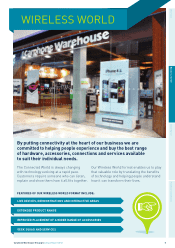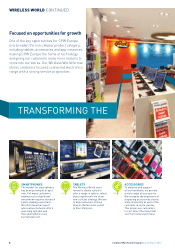Carphone Warehouse 2012 Annual Report Download - page 19
Download and view the complete annual report
Please find page 19 of the 2012 Carphone Warehouse annual report below. You can navigate through the pages in the report by either clicking on the pages listed below, or by using the keyword search tool below to find specific information within the annual report.
Carphone Warehouse Group plc Annual Report 2012 15
Overview Business review Governance Financial statements
These effects were countered by the first material benefits of
commercial terms agreed with network operators in 2009–10
underwhich CPW Europe receives a more significant share
ofcustomer spend after the initialcontract term.
Increasing visibility of customer behaviour beyond the initial contract
period has resulted in higher revenues being recognised at the initial
point of connection. This incremental revenue has been used to
support the customer proposition, reflecting our long‑held strategy
of investing the benefits of scale and commercial terms into the
customer proposition in order to drive market share.
Operating expenses decreased by 6.3% year‑on‑year to £727.8m
(2011: £776.9m). CPW Europe benefited from reduced operating costs
in its German service provider business, the gain on the disposal
ofPhone House Belgium, and ongoing cost reduction initiatives.
CPW Europe’s Headline EBIT margin increased from 3.8% to 4.1%,
reflecting the factors described above.
During the year CPW Europe refinanced its debt facilities, which
were due to expire in 2012, with a new RCF of £400m which matures
in July2015. The costs of the new RCF are significantly lower than
the previous debt facility. The interest charge for the year was
marginally up year‑on‑year at £16.4m (2011: £15.2m) as the lower
margin paid on the new RCF was offset by the write‑off offees
fromthe previous facility.
CPW Europe had an effective tax rate of 18.5% (2011: 20.8%).
Thedecrease reflects the reduction in the UK rate of tax from 28%
to26% and the resolution of various historical tax issues during
theyear.
DISCONTINUED BUSINESSES AND EXCEPTIONAL ITEMS
BEST BUY MOBILE
During the year the Group disposed of its interest in Best Buy Mobile
for an initial consideration of £813.0m and a further £25.0m in
consultancy payments over a five year period, both of which are
payable directly to the Group.
As a result of the disposal, CPW Europe's profit share ceased from
September 2011. CPW Europe’s share of pre‑tax profits for the year
was £45.0m (2011: £97.9m).
The profit share from Best Buy Mobile, along with certain costs
relating directly to the disposal, have been excluded from Headline
results in order to provide visibility of the performance of the
continuing business.
CPW Europe incurred cash costs of £27.7m in connection with
thedisposal and recorded non‑cash accounting charges of £0.7m.
These costs relate principally to the replacement of existing CPW
Europe incentive schemes, and the award of 7.0m shares in
theCompany to CPW Europe executives in recognition of their
contribution to the success of Best Buy Mobile and inherent value
included within existing incentive schemes. These shares are
restricted until 2015, representing an extension on the restriction
to2014 provided under the previous schemes. CPW Europe agreed
to pay £11.7m to the Group in relation to these shares, and incurred
further cash costs of £15.0m in relation to employment taxes and
other compensation that resulted from thetransaction. CPW Europe
also incurred fees of£1.0m in relation to the disposal. A taxcredit
of £7.2m has beenrecognised in respect of these charges. This has
been offset bythe derecognition of £12.7m of deferred tax assets
which are expected to be irrecoverable as a result of the transaction.
BEST BUY UK
During the year CPW Europe closed its Best Buy UK ‘Big Box’
business. While the 11 trial stores that had been opened had delivered
positive customer satisfaction scores, they did not have the national
reach to achieve scale, brand economies and anacceptable return
on investment. Thebusiness ceased trading inJanuary 2012, and
all back office operations have been closed. Seven of the 11leases
have been assigned, one of which is subject to planning consent,
and options have been granted on the remaining four, which are
expected to be exercised during 2012–13.
Best Buy UK incurred operating losses of £72.5m during the year
(2011: £62.2m) against which a tax credit of £19.5m (2011: £17.9m)
has been recognised. These operating losses, along with the
costsof closing the business, have been excluded from Headline
results inorder to provide visibility of the performance of the
continuingbusiness.
Total closure costs of £146.8m have been booked, against which
ataxcredit of£25.9m has been recognised. Closure costs comprise
£45.9m of non‑cash asset write‑downs, £57.5m in relation to
property leases, £10.7m inrelation to redundancies and other
employee‑related costs, and other costs of £32.7m, primarily
reflecting stock write‑downs andcontract exit costs.
























